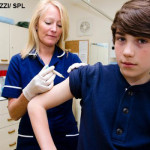 • Tobacco industry lobbying undermines public health in Asia
• Tobacco industry lobbying undermines public health in Asia
Martin McKee, Nichola Hopkinson, and K Srinath Reddy discuss the “fundamental and irreconcilable conflict between the tobacco industry’s interests and public health policy interests.” Whilst they acknowledge that “many Asian countries have a history of progressive tobacco control policies” such as the longstanding ban on tobacco advertising in Singapore, they highlight the ongoing influence of the tobacco industry in parts of Asia.
 • Direct benefit of vaccinating boys along with girls against oncogenic human papillomavirus: bayesian evidence synthesis
• Direct benefit of vaccinating boys along with girls against oncogenic human papillomavirus: bayesian evidence synthesis
A research article by Bogaards and colleagues from the Netherlands estimates the benefits to men of offering HPV vaccination to boys. Their findings show that men will benefit indirectly from vaccination of girls depending on level of vaccine coverage, but men remain at risk of cancers associated with HPV. ‘The incremental benefit of vaccinating boys when vaccine uptake among girls is high is driven by the prevention of anal carcinomas, which underscores the relevance of HPV prevention efforts for men who have sex with men’.
• In a linked editorial Karen Canfell argues that whilst developed countries are right to shift their attention to the matter of vaccinating boys, the priority in low and middle income countries should remain on broader efforts to prevent cervical cancer such as the development of integrated programmes for vaccinating young girls and screening older women. “Of the 610 000 cancers annually attributable to HPV worldwide, 87% are cancers of the cervix, and three quarters of these occur in countries with a low or medium human development index.”
 • Antipsychotic drug use in pregnancy: high dimensional, propensity matched, population based cohort study
• Antipsychotic drug use in pregnancy: high dimensional, propensity matched, population based cohort study
“There has been a considerable rise in antipsychotic medication use in pregnancy, from 3 per 1000 pregnancies in 2001 to 8 per 1000 in 2007.” Simone Vigod and colleagues report their cohort study results showing antipsychotic drug use in pregnancy had minimal evident impact on important maternal medical and short term perinatal outcomes. They do however advise that the rate of adverse outcomes is high enough to warrant “careful assessment of maternal and fetal wellbeing among women prescribed an antipsychotic drug in pregnancy.”
 • And finally, just in time for the weekend, apparently problem drinking is rising among England’s well educated women. A report released this week by the OECD on “Tackling harmful alcohol use” found that alcohol consumption is rising in the UK where “some 20% of highly educated women, and 23% of highly educated men, consumed a weekly amount of pure alcohol of 140 g or more for women or 210 g or more for men (the World Health Organization’s definition of hazardous consumption).” In England, problem drinking was particularly found to be concentrated among educated women with the highest proportion of hazardous drinking found among those aged 45 to 64.
• And finally, just in time for the weekend, apparently problem drinking is rising among England’s well educated women. A report released this week by the OECD on “Tackling harmful alcohol use” found that alcohol consumption is rising in the UK where “some 20% of highly educated women, and 23% of highly educated men, consumed a weekly amount of pure alcohol of 140 g or more for women or 210 g or more for men (the World Health Organization’s definition of hazardous consumption).” In England, problem drinking was particularly found to be concentrated among educated women with the highest proportion of hazardous drinking found among those aged 45 to 64.
Kate Adlington is a clinical fellow at The BMJ. Follow Kate on Twitter @kateadlington
